Did you know that over 50% of Poodles in the United States are considered overweight? Understanding how to manage your Poodle’s weight through proper diet and exercise is crucial for their overall health and longevity. By implementing simple yet effective strategies, you can help your furry companion achieve and maintain a healthy weight. Ready to discover practical tips that can make a significant difference in your Poodle’s well-being?
Key Takeaways
- Assess ideal weight and calorie needs for your Poodle.
- Implement tailored exercise routines for weight management.
- Monitor progress regularly and adjust plans as necessary.
- Collaborate with a vet for optimal diet and exercise strategies.
Signs of Overweight Poodles
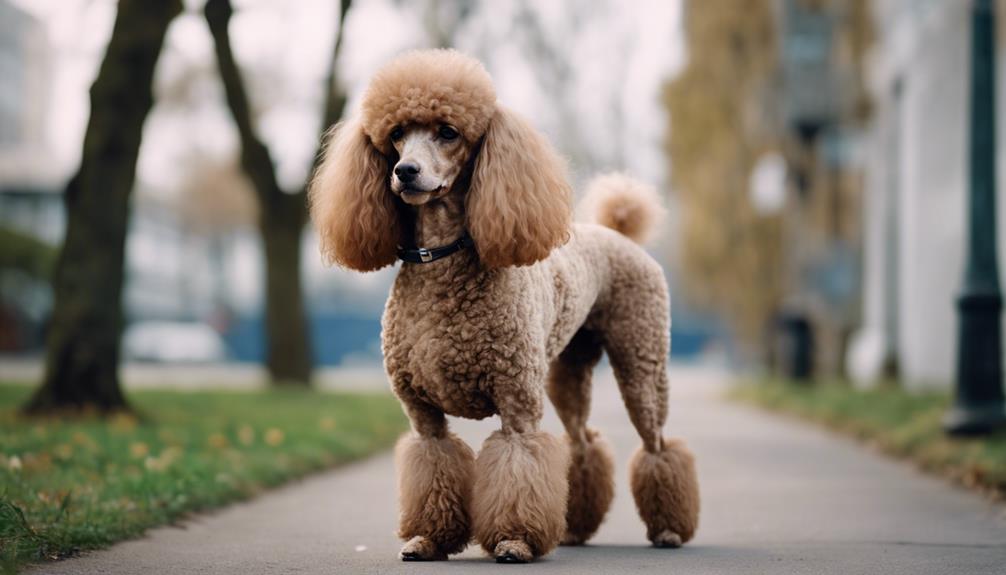
If you notice that your poodle lacks a defined waist or that feeling its ribs is challenging, these could be signs of an overweight poodle. Obesity in Poodles can lead to various health issues such as lethargy, joint pain, skin problems, and a reluctance to engage in physical activities. An overweight Poodle may exhibit signs of tiredness, struggle with breathing, and show disinterest in exercise. Additionally, excess weight can impact their skin, causing irritation and other dermatological concerns. Joint pain is also a common problem for overweight Poodles, making it difficult for them to jump, run, or play comfortably. Monitoring your poodle’s body condition score regularly can help you keep track of their weight and overall health. Providing opportunities for exercise and maintaining a healthy diet are crucial in preventing and managing obesity in Poodles. Be attentive to these signs to ensure your poodle leads a happy and healthy life.
Health Risks of Obesity
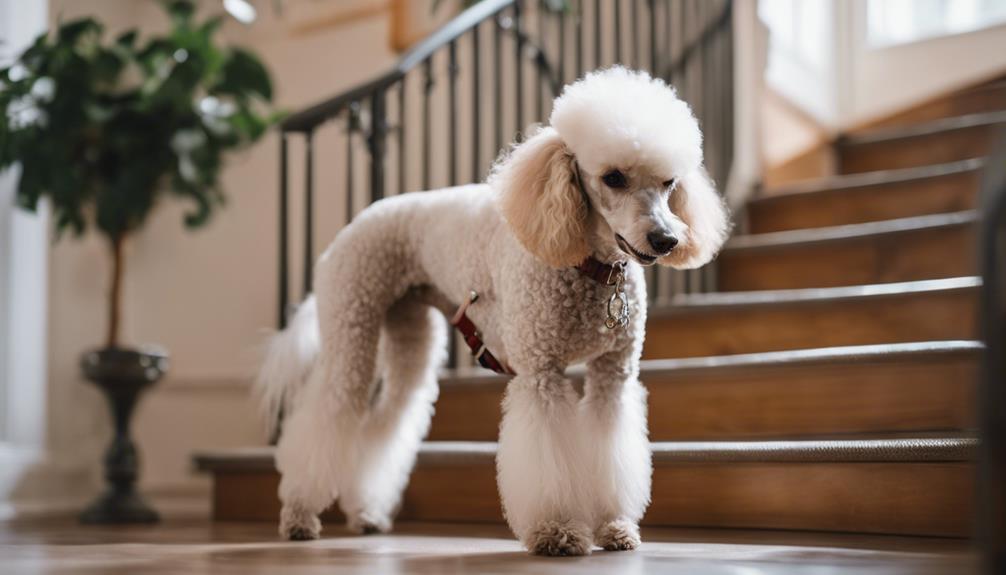
Carrying excess weight can expose your Poodle to a range of serious health risks, including diabetes, heart disease, joint problems, and a shortened lifespan. Due to their small size, even a slight weight gain can have significant consequences for Poodles. The strain that extra weight puts on their joints can lead to issues like arthritis and mobility problems, impacting their overall health and quality of life.
Obesity Health Dangers
Obesity in poodles poses a significant threat to their health, leading to conditions such as diabetes, heart disease, joint injuries, and high blood pressure. Overweight poodles not only have a shorter lifespan and lower energy levels but also face an increased risk of certain cancers. Excess weight can obscure early signs of illness, delaying essential medical care. Maintaining a healthy weight is crucial for poodles to live longer, healthier lives with a better overall quality of life. Addressing obesity in poodles requires immediate veterinary attention and the implementation of a tailored weight management plan to reduce the associated health risks. Prioritizing weight management in poodles is essential for preventing the onset of these serious health issues.
Weight-Related Illnesses
Excess weight in poodles not only impacts their overall quality of life but also significantly increases the risk of developing various weight-related illnesses. When addressing weight-related issues in poodles, it is crucial to understand the potential health risks associated with obesity. Here are three key health risks of excess weight in poodles:
- Diabetes: Obesity can increase the likelihood of poodles developing diabetes, a condition that requires careful management and can impact their quality of life.
- Heart Disease: Poodles carrying extra weight are at a higher risk of heart disease, which can severely affect their overall health and well-being.
- Joint Problems: Excess weight puts strain on the joints of poodles, leading to increased risk of arthritis and other joint-related issues.
Health Impacts of Obesity
Straining the joints and increasing the risk of serious health conditions, excess weight in Poodles can have detrimental effects on their overall well-being and longevity. Obesity in Poodles can lead to diabetes, heart disease, joint issues, and a decreased lifespan. Overweight Poodles are at higher risk of certain cancers and may experience reduced energy levels. It is crucial to maintain a healthy weight in Poodles as obesity can mask underlying health issues, making early detection challenging. Additionally, excess weight puts strain on their joints, increasing the likelihood of osteoarthritis and injuries. To ensure Poodles live longer, healthier lives, weight management through proper diet and exercise is essential in preventing obesity-related complications.
Assessing Diet and Exercise
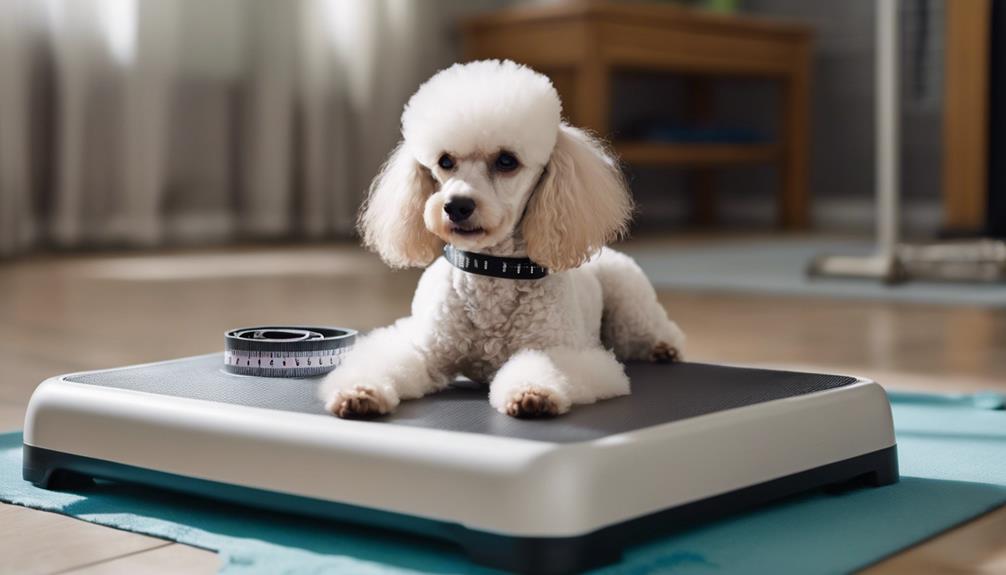
When assessing diet and exercise for your Poodle, it is crucial to collaborate with a veterinarian to determine their ideal weight and calorie requirements. Here are three key points to consider:
- Ideal Weight and Calorie Needs: Your veterinarian will assess your Poodle’s current weight and body condition to establish a target weight range. They will also calculate the appropriate daily calorie intake based on factors like age, activity level, and overall health.
- Tailored Exercise Routine: Tailoring exercise routines to your Poodle’s age, health status, and fitness level is essential. Incorporating activities like walks, playtime, and interactive games can help maintain their weight and promote overall well-being.
- Monitoring Progress: Regularly monitoring your Poodle’s food intake and energy expenditure is vital for effective weight management. Weighing your Poodle frequently and observing any signs of weight changes will help track progress and make necessary adjustments to their diet and exercise regimen.
Vet Check-ups Importance
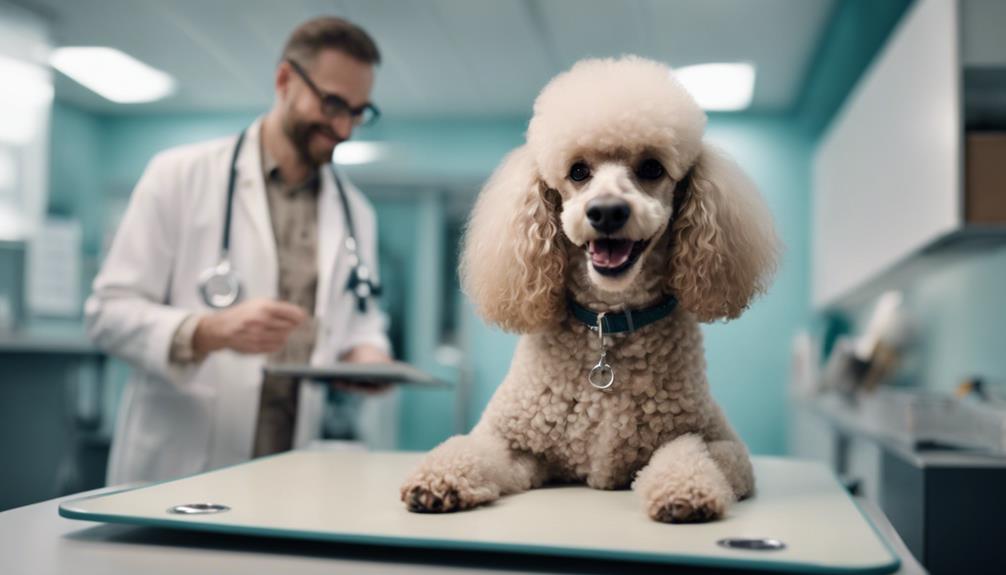
Regular veterinary check-ups play a crucial role in monitoring the progress of weight management in Poodles. Consulting with your veterinarian regularly is essential for effective weight control and ensuring the overall health and well-being of your pet. These check-ups are not just about tracking weight changes but also about identifying any underlying medical issues that could be impacting your Poodle’s weight management progress. Your veterinarian can provide professional guidance, set safe weight loss goals, and offer tailored recommendations to help your Poodle reach and maintain a healthy weight. By prioritizing vet check-ups, you are taking proactive steps to address any concerns early on and to ensure that your Poodle’s weight management plan is on the right track. Remember, your veterinarian is your partner in your Poodle’s weight management journey, so make sure to schedule regular visits for continued support and guidance.
Identifying Weight Loss Needs
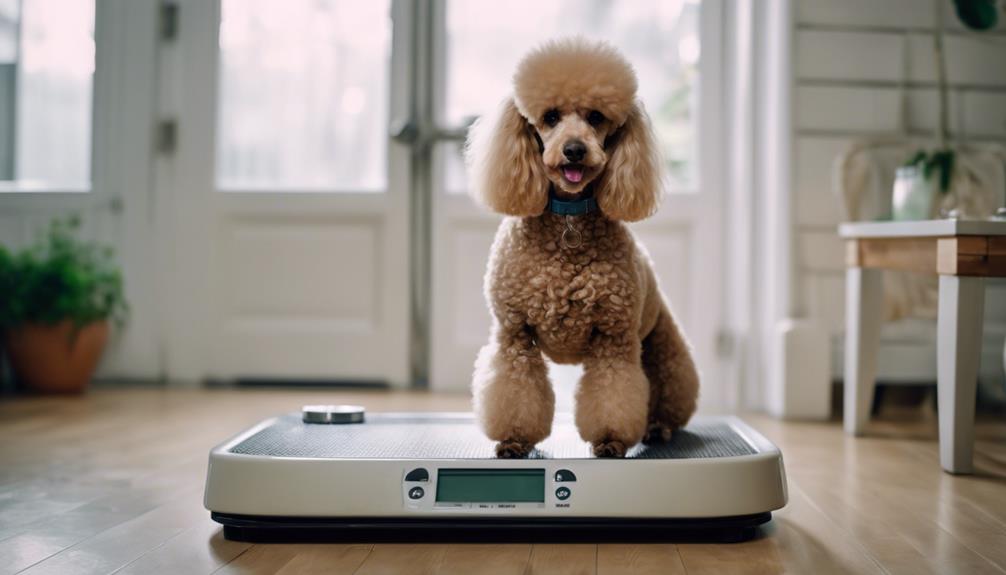
To identify your Poodle’s weight loss needs, start by assessing its current weight against its ideal range. Set realistic goals based on this assessment to ensure healthy progress. Monitor your Poodle’s weight regularly to track changes and determine if weight loss is necessary for its well-being.
Assessing Current Weight
Assessing a Poodle’s current weight involves determining its ideal weight based on breed standards and body condition scoring, essential for identifying weight loss needs.
Key Points:
- Breed Standards: Compare your Poodle’s current weight to the standard weight range for its breed to assess if it falls within a healthy range.
- Body Condition Scoring: Use a scoring system to evaluate your Poodle’s body composition through visual and tactile assessments, helping determine if it is overweight or underweight.
- Health Risks: Understand the potential health risks associated with excess weight in Poodles, including joint issues and a shorter lifespan. Identifying these risks can highlight the importance of managing your Poodle’s weight effectively.
Setting Realistic Goals
When setting realistic weight loss goals for your Poodle, consulting with a veterinarian to identify the ideal weight range is crucial. By determining your Poodle’s current weight and calculating the percentage of body weight that should be targeted for safe weight loss, you can establish achievable milestones. Setting gradual goals based on the recommended rate of weight loss is essential for your Poodle’s health. Monitoring progress regularly will help you stay on track and make necessary adjustments to the weight management plan. Here is a table to help you understand the process better:
| Step | Description |
|---|---|
| Consult Veterinarian | Identify ideal weight range |
| Calculate Target Weight Loss | Determine safe weight loss percentage |
| Set Achievable Milestones | Establish gradual goals based on recommended rate of weight loss for Poodle’s health |
| Monitor Progress | Regularly track progress and adjust weight management plan as needed to stay on track |
Monitoring Progress Regularly
Regularly monitoring your Poodle’s weight is a crucial aspect of tracking progress in their weight management program. Here are some essential points to consider:
- Weigh your Poodle at least once a month to evaluate the effectiveness of the diet and exercise regimen.
- Tracking weight loss progress helps identify the need for adjustments in feeding or exercise routines.
- Monitoring progress allows you to ensure your Poodle is on track to achieve a healthy weight.
Exercise for Weight Management
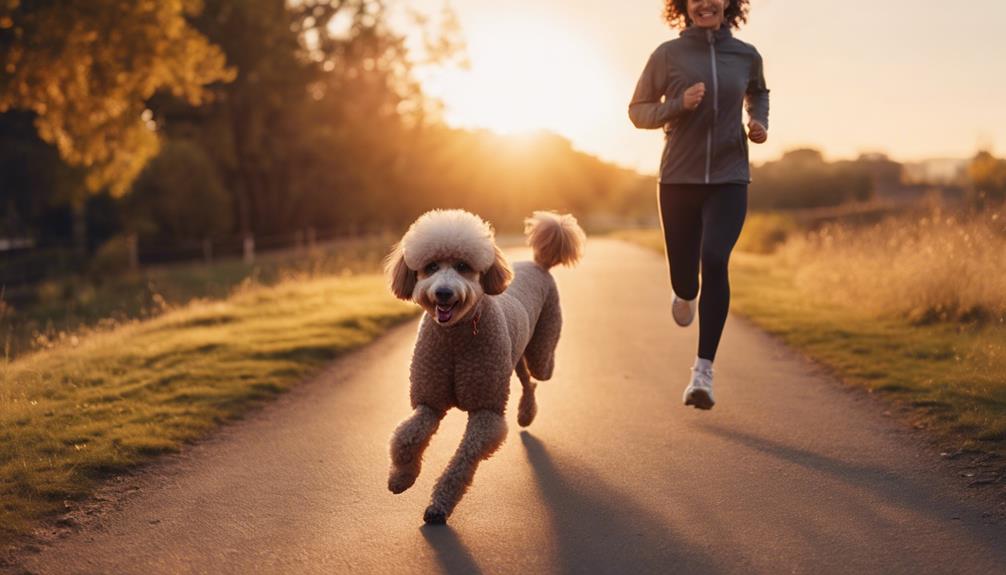
To effectively manage your Poodle’s weight, incorporating tailored exercise routines is crucial for burning calories and promoting overall health. When it comes to weight management in Poodles, regular physical activity plays a vital role in helping them stay fit and healthy. Tailor your Poodle’s exercise plan to their age, health status, and fitness level to ensure optimal results. Daily walks, engaging playtime sessions, and even agility training can all contribute to weight loss and overall well-being in your furry companion. Introducing variety gradually in their exercise activities can prevent boredom and keep them interested in staying active.
| Exercise Activities | Benefits |
|---|---|
| Daily walks | Helps burn calories |
| Playtime sessions | Promotes weight loss |
| Agility training | Improves overall health |
| Variety in activities | Prevents boredom |
| Tailored exercise plan | Meets specific needs |
Consulting with your veterinarian to create a personalized exercise plan for your Poodle can ensure that their specific requirements are met and contribute significantly to their weight management journey.
Portion Control Tips
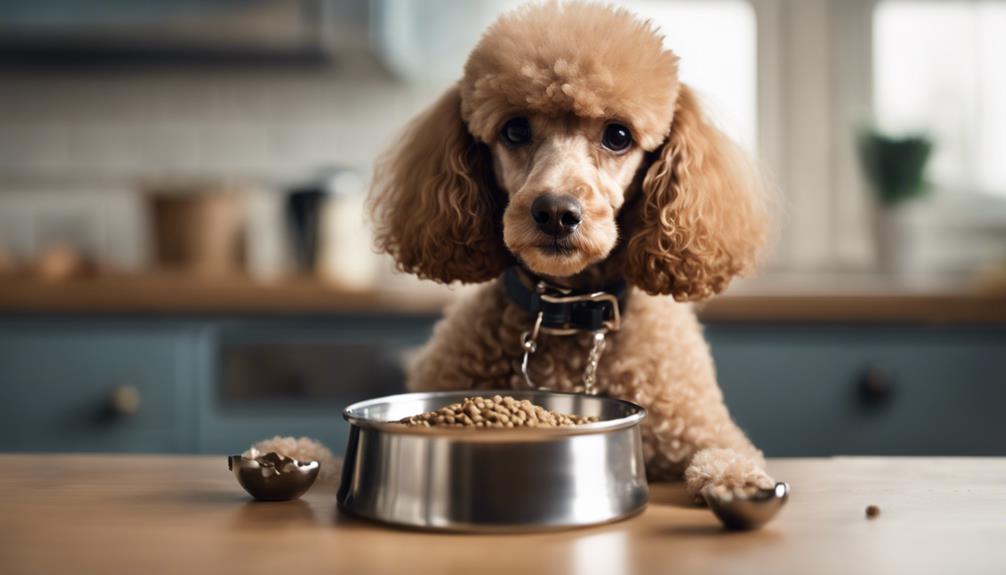
To effectively manage your Poodle’s weight, it’s crucial to use a measuring cup for precise portion control. Following feeding guidelines will help prevent weight gain risks and maintain a healthy diet. Establishing a routine feeding schedule and seeking veterinary advice for tailored portion sizes are key steps in managing your Poodle’s weight effectively.
Food Measuring Techniques
For precise portion control when feeding your Poodle, make sure to use a measuring cup. Measuring your Poodle’s food accurately is key to managing their calorie intake and weight control. Here are three essential food measuring techniques to help you maintain the recommended portion sizes and keep your furry friend healthy:
- Use a Measuring Cup: Opt for a standardized measuring cup to ensure consistency in portion sizes.
- Follow Feeding Guidelines: Refer to the packaging or consult your veterinarian for recommended portion sizes based on your Poodle’s weight and activity level.
- Avoid Eyeballing Portions: To prevent overfeeding, resist the temptation to estimate portions and rely on precise measurements instead.
Treats Moderation Tips
When managing your Poodle’s weight, mastering portion control extends beyond meals to also include careful moderation of treats. To prevent weight gain in Poodles, limit treats to no more than 10% of your dog’s daily calorie intake. Opt for healthy treats like carrots or green beans, which are low in calories, especially during training sessions. Steer clear of table scraps and high-calorie human foods as treats to maintain a balanced diet. Consider using treat-dispensing toys or puzzle feeders to make treats last longer and provide mental stimulation. Monitor your Poodle’s treat consumption closely and adjust meal portions accordingly to avoid overfeeding and support your dog’s weight loss journey.
Suitable Poodle Diets
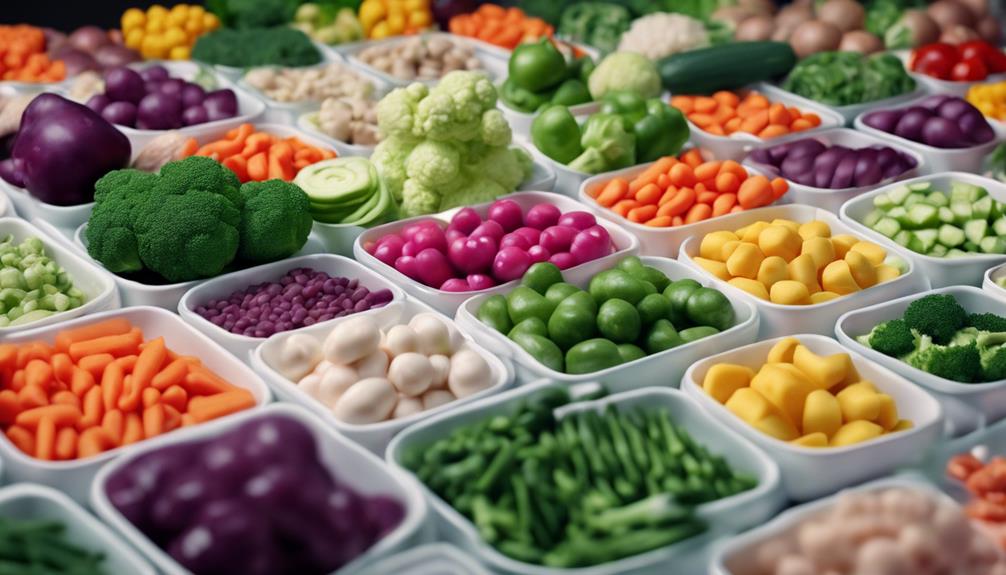
Opt for a high-protein, low-carb diet rich in lean proteins, fruits, and vegetables to support weight management in Poodles. When choosing suitable Poodle diets, consider the following:
- High-Protein Content: Ensure your Poodle’s diet contains ample high-quality proteins like chicken, turkey, or fish to support muscle maintenance and weight management.
- Low-Carb Approach: Opt for a low-carb diet to prevent excess calorie intake and promote a balanced energy level for your Poodle’s daily activities.
- Nutrient-Dense Foods: Focus on nutrient-dense foods such as fruits and vegetables to provide essential vitamins and minerals while keeping the calorie count in check.
Treat Monitoring
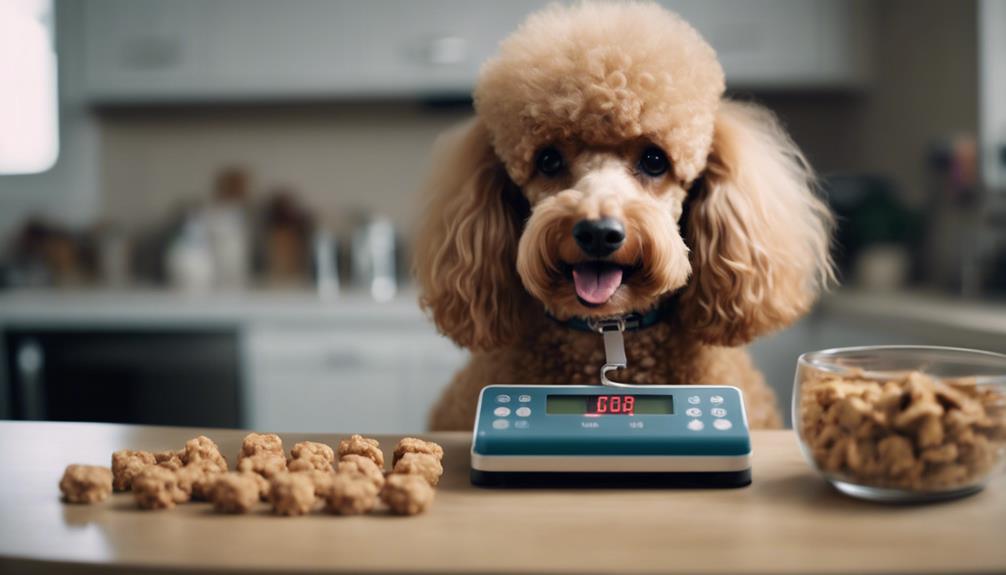
To effectively manage your Poodle’s weight, closely monitor the intake of treats to control calorie consumption and prevent unwanted weight gain. Treats can add up quickly, impacting your Poodle’s overall calorie intake. Opt for healthy, low-calorie treats to ensure a balanced diet while still providing rewards. It’s crucial to limit the frequency of treats to prevent excess calories in your dog’s daily diet. Instead of traditional treats, consider using meal portions as treats to avoid overfeeding and assist in weight management efforts. By incorporating meal portions as treats, you can control the calorie intake more effectively. Remember, treats should be minimal and not disrupt the nutritional balance of your Poodle’s diet. This strategic approach to treat monitoring is essential in implementing successful weight management strategies for your beloved Poodle. By being mindful of treat intake and choosing wisely, you can help your Poodle maintain a healthy weight and overall well-being.
[1-Pack] Dog Food Measuring Cup For Accurate Portions – Pet Food Measuring Cup to Make Feeding Your Dog a Breeze – Food Scooper For Pets With Food-Grade Sturdy Plastic – Dog Food Scoop For Travel
Features
| Manufacturer | Maplefield |
| Item Weight | 5 ounces |
| Package Dimensions | 8.46 x 6.69 x 2.95 inches |
| Size | 1 Pack |
| Material | Plastic |
| Item Package Quantity | 1 |
| Number Of Pieces | 1 |
| Batteries Included | No |
| Batteries Required | No |
| Capacity | 500 Milliliters |
| Volume | 500 Milliliters |
| Units | 1.0 Count |
| Number of Sets | 1 |
- Pawfect Kibble Portion Furrever – No more guesswork during feeding time, hooman! Measure accurate portions for your pup with our versatile 500ml dog food measuring scoop. Easily avoid under or overfeeding. Get it just right with our adjustable 8 volume dog food cup
- Only The Best For Your Furry Friend– Serve the healthiest treats to your fur boys and girls with this safe dog food scooper. No health concerns are needed when using these food-grade plastic pet food measure scoops
- No More Mess And Wastage – Transfer kibble neatly around eager doggos with these easy-pour dog food scoops. This dog measuring scoop employs a convenient slide disk that locks tightly for a no-spill transfer of dry food
- The Best For Busy Lifestyles – Make your life easier with an ultra-sturdy, dishwasher-safe scooper for dog food. Each dog food cup measure is designed with high impact rubber plastic that bounces and stays intact when dropped
- More Capacity, More Lightweight – No more pawblems or cattitude on the road. Travel easy with your cuddly buddies. These compact dog measuring cups can be carried on-the-go. Serve your pets to their hearts’ content with these 2 cup capacity dog food cups
Petmate 2 Cup Pet Food Scoop With Measuring Lines; BPA Free,Silver
- Measures While You Scoop: This 2 cup capacity pet food scoop includes measurement lines so you can portion servings without a separate measuring cup
- Easy To Clean: Dishwasher safe
- BPA-Free: Help protect your dog or cat from harmful plastic chemicals
- 25% Recycled Content: Made with 25% recycled plastic to help the environment. Made in the USA
- JUST FOR PETS: Petmate makes a variety of pet products for dogs, cats, chickens & other small furry friends! Check out our brands such as Aspen Pet, Arm & Hammer, Booda, Chuckit! , Jackson Galaxy & more!
HINMAY Pet Food Scoops Plastic Measuring Cups Set for Dog Cat and Bird Food (Random Color)
Features
| Manufacturer | HINMAY |
| Part Number | petdogteehww1-02 |
| Item Weight | 3.84 ounces |
| Product Dimensions | 4.92 x 7.24 x 8.82 inches |
| Country of Origin | China |
| Item model number | petdogteehww1-02 |
| Is Discontinued By Manufacturer | No |
| Color | Random Color |
| Material | Acrylonitrile Butadiene Styrene (ABS) |
| Item Package Quantity | 1 |
| Number Of Pieces | 1 |
| Special Features | Dishwasher safe |
| Batteries Included | No |
| Batteries Required | No |
| Capacity | 1 Cups |
| Item Weight | 3.84 ounces |
| Units | 4 Count |
| Number of Sets | 4 |
- Made of ABS food grade level material, safe for pets.
- Includes 4 clearly marked spoons in standard measuring sizes (1 C, 1/2 C, 1/3 C, 1/4 C).
- Use for measuring pet food portions (dog, cat, bird, etc.) or even ingredients while cooking or baking.
- Can be used for dry or liquid measurements. Flat base allows it to lay upright.
- The cups can be detached from the connector for easy use, cleaning and storage; Dishwasher safe.
Culacos Dog Food Scoop, Adjustable Pet Food Measuring Cup, 1/2 Cup 1/3 Cup 1/4 Cup/1~4 Oz/30~130Ml
Features
| Manufacturer | Culacos |
| Part Number | L |
| Item Weight | 1.6 ounces |
| Product Dimensions | 7 x 2.3 x 2.8 inches |
| Country of Origin | China |
| Item model number | L |
| Color | Large |
| Material | Plastic |
| Item Package Quantity | 1 |
| Special Features | Adjustable Measuring |
| Included Components | 1 * Dog food scoop |
| Batteries Included | No |
| Batteries Required | No |
| Capacity | 4 ounces |
| Volume | 130 Milliliters |
| Item Weight | 1.6 ounces |
| Units | 1.0 Count |
| Number of Sets | 1 |
- Prevents Pet Obesity: Easily measure precise dog food portions with clear volume markings, aiding in controlling your pet's diet.
- Adjustable Food Scooper: Adjustable silicone scraper, offering various measurements from 1/8 cup to 1/2 cup, catering to different pet growth stages.
- One Spoon, Many Uses: Ideal for dog, cat, or bird food, also handy in kitchens, farms, and more.
- Safe Materials: Dog food scoop meda from food-grade materials, ensuring safety for your pet's food consumption.
- Easy to Clean: Just rinse after wet food for a hygienic pet food scoop, ensuring their health.
Feeding Schedule Consistency
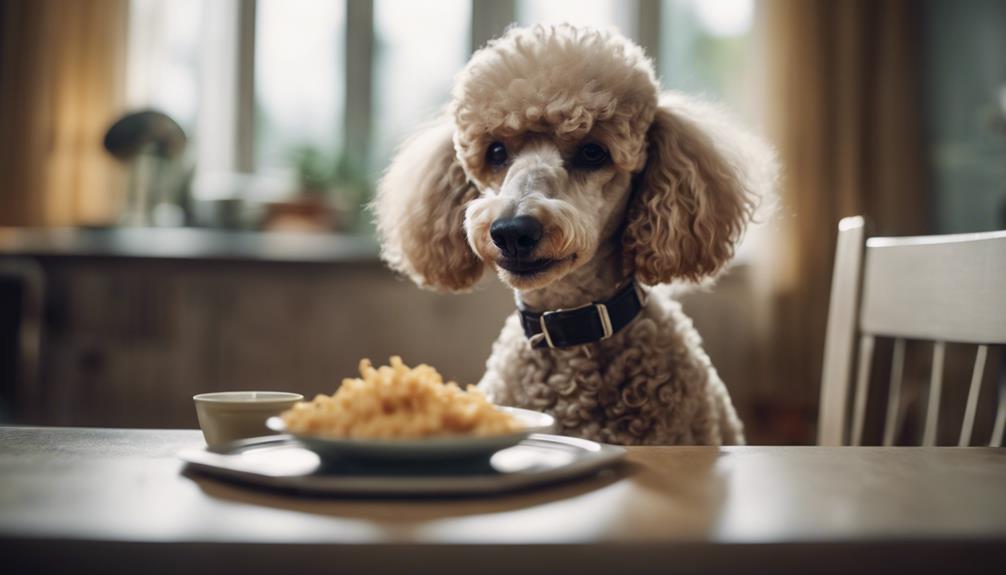
Monitoring your Poodle’s weight through treat intake control is crucial, and establishing a consistent feeding schedule plays a vital role in maintaining their overall well-being and weight management. Consistency in feeding schedules is essential for your Poodle’s health and weight control. Here’s why:
- Regulating Metabolism and Digestion: A consistent feeding routine helps regulate your dog’s metabolism and aids in proper digestion, preventing issues like bloating or upset stomach.
- Promoting Healthy Eating Habits: Regular mealtimes establish a routine for your Poodle, promoting healthy eating habits and preventing erratic eating behaviors.
- Portion Control and Weight Management: Scheduled feeding prevents overeating by controlling portion sizes. This not only contributes to weight management but also ensures your Poodle is getting the right amount of food for their size and activity level.
Motivating Exercise
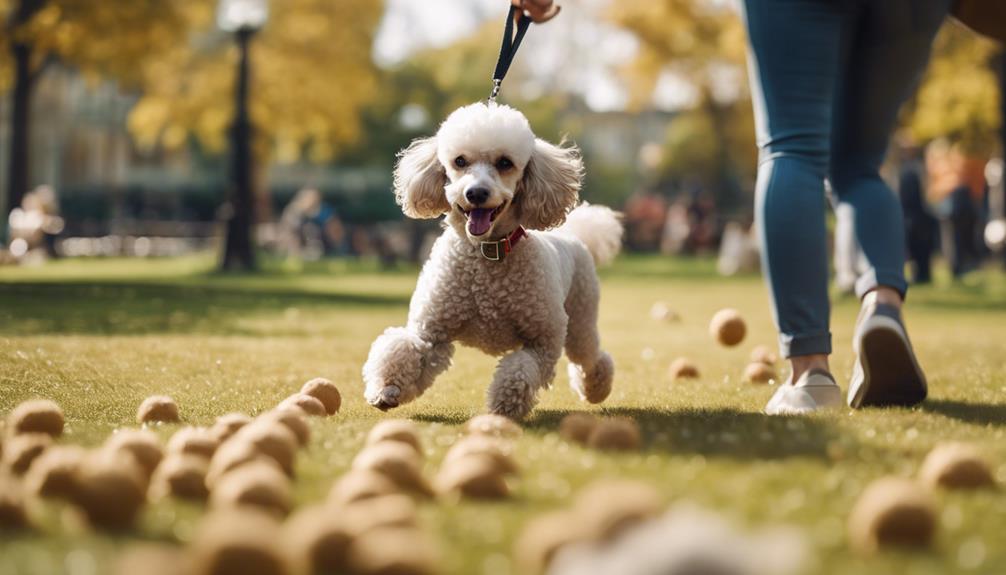
Regular exercise plays a crucial role in stimulating metabolism and aiding in weight loss for Poodles. To help your Poodle maintain a healthy weight, engaging in daily walks and other physical activities is essential. Tailoring exercise routines to your Poodle’s age and fitness level ensures effective weight management. Introducing variety in exercise activities such as playing fetch or agility training can prevent boredom and promote overall health. Consulting a veterinarian for a personalized exercise plan can optimize weight loss efforts for your Poodle. Remember, consistency is key when it comes to motivating exercise in your Poodle. Make it a habit to incorporate daily walks or playtime into your routine. By staying active together, you not only help your Poodle stay fit but also strengthen the bond between you. Regular exercise is not only beneficial for weight management but also contributes to your Poodle’s overall well-being.
Frequently Asked Questions
What Is the Best Exercise for an Overweight Dog?
For an overweight dog, the best exercise involves indoor activities, water therapy, low-impact exercises, leash walks, interactive toys, treadmill training, and agility courses. These options can help manage weight, improve health, and provide mental stimulation.
What Can I Feed My Overweight Dog to Lose Weight?
To help your overweight dog lose weight, offer healthy treats sparingly, control portions, consider weight loss supplements, provide low-calorie meals, engage in doggy exercise, maintain a balanced diet, and follow vet recommendations for optimal results.
What Is the Fastest Way for a Dog to Lose Weight?
To help your furry friend shed excess pounds swiftly, focus on healthy diet choices and a consistent exercise routine. Prioritize a balanced nutrition plan, portion control, and vet consultations for effective weight management.
Are Poodles Prone to Obesity?
You bet! Poodles, with their love for food and sedentary lifestyle, are often prone to obesity. Those genetics may not make it easy, but with the right diet, exercise, and support, they can stay healthy and fit.
Conclusion
In conclusion, staying on top of your Poodle’s weight management is crucial for their overall health and well-being. By keeping a close eye on their diet and exercise regimen, you are ensuring a long and happy life for your furry companion. Remember, a little extra love and attention in this area can go a long way in keeping your Poodle healthy and happy. Keep up the good work!
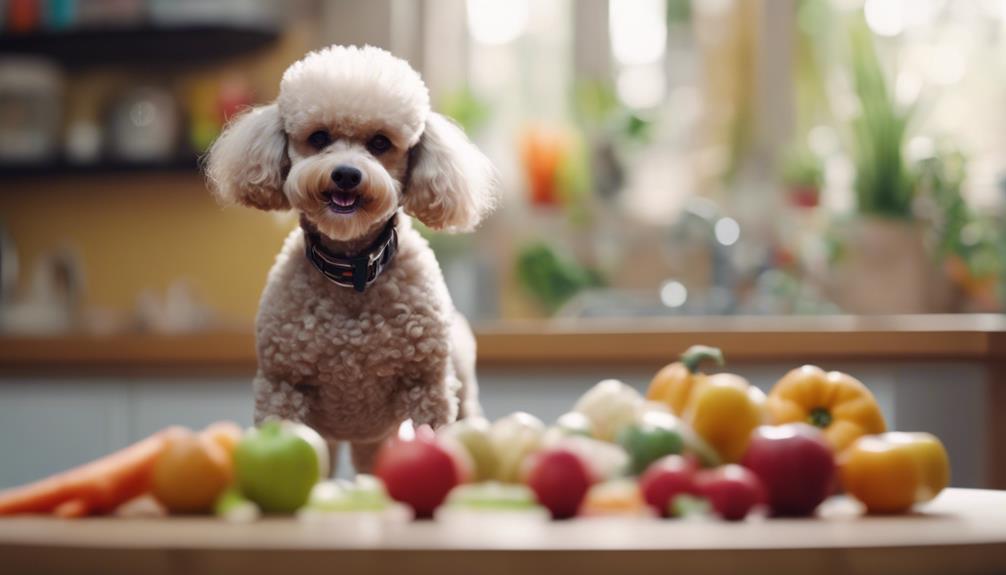
![[1-Pack] Dog Food Measuring Cup For Accurate Portions – Pet Food Measuring Cup to Make Feeding Your Dog a Breeze – Food Scooper For Pets With Food-Grade Sturdy Plastic – Dog Food Scoop For Travel](https://m.media-amazon.com/images/I/81lsCccgsbL._AC_SL520_.jpg)


